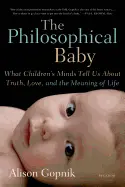
The Philosophical Baby - by Alison Gopnik
ISBN: 0312429843Date read: 2013-11-21
How strongly I recommend it: 2/10
(See my list of 430+ books, for more.)
Go to the Amazon page for details and reviews.
A good friend highly recommended this as one of his favorite books on baby-hood. I just didn't connect with it, after a few attempts. You may love it.
my notes
Babies not only learn more, but imagine more, care more, and experience more.
Young children are actually smarter, more imaginative, more caring, and even more conscious than adults are.
Developing a new theory about the world allows us to imagine other ways the world might be. Understanding other people and ourselves lets us imagine new ways of being human.
To change our world, our selves, and our society we have to think about what we ought to be like, as well as what we actually are like. This book is about how children develop minds that change the world.
Learning takes time. It would be a good idea for me to spend a week exploring all the capabilities of my new computer, as my teenage son would, but with grant deadlines and classes breathing down my neck, I’ll just go on relying on the old routines.
Children are the R&D department of the human species - the blue-sky guys, the brainstormers. Adults are production and marketing.
High IQ is correlated with later maturing and more plastic frontal lobes. Keeping your mind open longer may be part of what makes you smarter.
Our protracted immaturity is possible only because we can rely on the love of the people who take care of us.
Counterfactuals about the past, and the characteristically human emotions that go with them, seem to be the price we pay for counterfactuals about the future. Because we are responsible for the future, we can feel guilty about the past; because we can hope, we can also regret.
Two- and three-year-olds are extremely good at distinguishing imagination and pretense from reality. One of the most distinctive things about pretend play is the fact that it’s accompanied by giggles. It’s the giggles, the knowing look, the dramatic exaggeration, that signal that this is not to be taken seriously.
Children may seem confused because they are such expressive and emotional pretenders. They can have real emotional reactions to entirely imaginary scenarios.
It may seem that the child trembling under the covers must believe that there really is a monster in the closet. But this is not because children don’t understand the difference between fiction and fact. They are just more moved by both than grown-ups.
Children who better understand minds are more socially skillful than those who do not, but they are also better liars. They’re more sympathetic but they’re better at getting under your skin too.
Walter Mischel marshmallows: You might think that children just developed more willpower, and there is some truth to that. But children also got better and better at doing things to their own minds to make them behave differently. The successful children put their hands over their eyes, or hummed, or sang. They did much better when they tried imagining that the marshmallows were merely big puffy clouds and not tempting treats. As adults we use similar strategies all the time to regulate our own actions.
Children who had imaginary friends were better at predicting how other people would think, feel, or act. Fiction writers reported experiencing their characters as autonomous agents. Fiction writers seemed to maintain an acquaintance with their old imaginary friends.
I’ve learned more about human personality and social life from Jane Austen than from the Journal of Personality and Social Psychology.
An American child learns what American minds are like, and a Japanese child learns what Japanese minds are like, But that learning seems to invite her, to make her mind into an American or Japanese one.
Does that discovery make her become somebody who values individuality more than cooperation herself?
Imaginary worlds seem just as important and appealing as the real ones.
They don’t see any particular reason for preferring to live in the real one. Children are useless on purpose. Because children don’t have to restrict our imaginings to the immediately useful, we can freely construct causal maps and exercise our ability to create counterfactuals. We can compute a wide range of possibilities, not just the two or three that are most likely to pay off. We can consider different ways the world might be, not just the ways the world actually is.
Inhibition - the ability to keep yourself from acting impulsively. Children are uninhibited. If your agenda is simply to explore both the actual world and all the possible worlds, this apparent defect may be a great asset. Pretend play is notably uninhibited.
Lantern consciousness leads to a very different kind of happiness.
We lose our selves by becoming part of the world.
“Beginner’s mind,” the mind as it is uncontaminated by expertise.